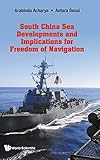South China Sea developments and implications for freedom of navigation Arabinda Acharya and Antara Desai
Material type: TextPublication details: World Scientific 2022ISBN:
TextPublication details: World Scientific 2022ISBN: - 9781800610330
- 355.033051 ACH
| Item type | Current library | Call number | Materials specified | Status | Date due | Barcode | |
|---|---|---|---|---|---|---|---|
 Books
Books
|
Rashtriya Raksha University | 355.033051 ACH (Browse shelf(Opens below)) | Available | 12237 | |||
 Books
Books
|
Rashtriya Raksha University | 355.033051 ACH (Browse shelf(Opens below)) | Available | 12238 |
Browsing Rashtriya Raksha University shelves Close shelf browser (Hides shelf browser)
The South China Sea (SCS) has emerged as a theatre of political, economic, and security concerns not only for the countries in the region but also for the world at large. Contrary to conventional wisdom, the SCS issue is not about contestation over territory or control over resources alone. With military facilities including airstrips and artificial islands or structures being built in the area, concerns about freedom of navigation and the right to innocent passage have also become an overwhelming security issue and made the SCS region a flashpoint which, according to many assessments, can lead to confrontations including those involving conventional military means. Disruption of maritime passage could also hamper trade and commerce with very negative impacts on the economic development of the region and other countries. It is now being held that China could also be using the SCS disputes as part of a consorted effort to deflect geo-political pressures on account of the COVID-19 pandemic-related cover-ups and misinformation. This book explores the historical and strategic context of the South China Sea disputes and makes an assessment of the implications of the same for freedom of navigation and other regimes at sea.
There are no comments on this title.





